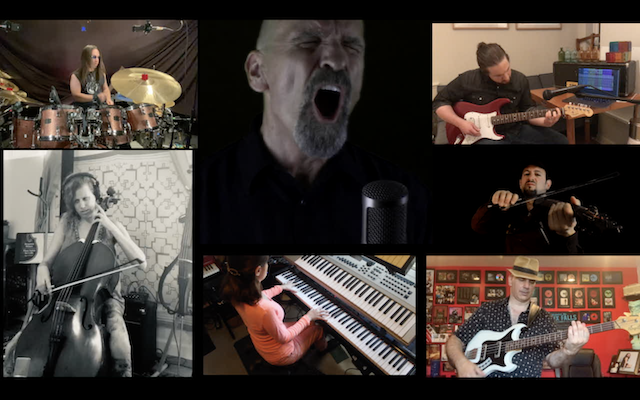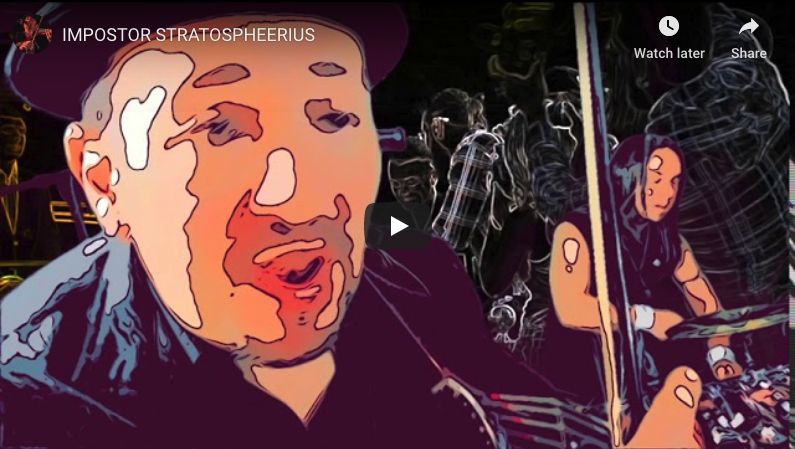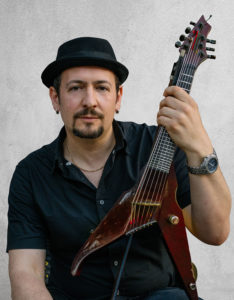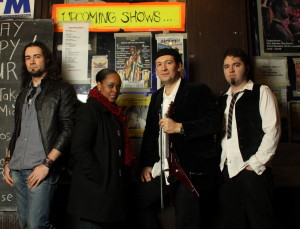Joe Deninzon interview by James Popick
Joe Deninzon talks about the new Stratospheerius song, “Storm Surge” with special guests Michael Sadler from Saga, Fernando Perdomo, Ruti Celli, and Rachel Flowers.w Joe Deninzon interview with James Popick
https://jamesapopik.substack.com/p/storm-surge-by-joe-deninzon
Awesome new review of our video, “Impostor!” at www.sonicperspectives.com
Read the new review of Stratospheerius video, “Impostor!” at www.sonicperspectives.com
Listen to Joe Deninzon’s interview on New Ears podcast
Joe Deninzon interview with Proglodytes.com
Guilty of Innocence review by Arno Agterberg for DPRP.net
4-Star Review of “Guilty of Innocence” by Progression Magazine

Four-Star Review of Joe Deninzon & Stratospheerius album, “Guilty of Innocence” by Progression Magazine!
Critics Rave about “Guilty of Innocence!”
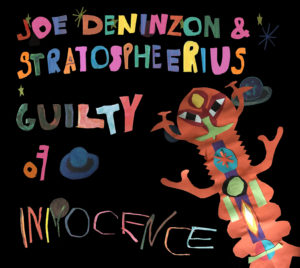
DEC, 2017 REVIEW BY Strings Magazine
With herky-jerky momentum, the sinister yet jolly “Behind the Curtain” kicks o Joe Den-inzon & Stratospheerius’ exhilarating fifth album Guilty of Innocence. Chunky guitars, a battery of drums, and a seesawing Jacob’s lad- der of electric violin battle for supremacy as Deninzon’s piercing tenor equates American exceptionalism with the fraudulent Wizard of Oz. e metaphor has been employed before, but seldom with such panache.
Deninzon has been called the Jimi Hen- drix of electric violin, and that comparison seems apt on “Dream Diary Cadenza,” an excerpt of Deninzon’s solo concerto, where his violin swoops, howls, and dive bombs amid quickening arpeggios.
Elsewhere, Deninzon nods to Jean-Luc Ponty and George Clinton’s Funkadelic while charting an eccentric course that conjoins whiplash funk, spacey electronic, and pro- gressive rock. Vocals adopt a snarky tone, but the lyrics convey anything but cynicism. Deninzon is a moralist raising an alarm and pointing out insanity.
“Take Your Medicine,” a revenge fantasy aimed at scam artists, entangles Deninzon’s hyperkinetic bowing and a rubbery bass line in a muscular groove. The set’s title track lambasts the United States court system with squawking guitar, wiseacre lyrics, and Den- inzon’s dust-devil ostinatos.
On “Face,” coiled percussion, crunchy gui- tars, and whirlpooling violin entangle in a grand slalom of power chords, syncopation, and distortion. e 12-minute progressive rock epic “Soul Food” reels out vertiginous violin switchbacks, operatic choruses, and pummeling panzer division drums before galloping to a nale that combines crescendo and cacophony.
Splashy and theatrical, Guilty of Innocence is a howl for justice delivered by virtuosos completely in synch with one another. It’s a darkly comic clarion call to combat a u- enza, self-delusion, and the commoditiza- tion of daily life. Otherwise, Deninzon seems to say, we’re just another brick in the mall.
MORE CRITICAL ACCLAIM!
“When you put distorted guitars up against a violin you get magic. When you put a violin solo in a metal song, you get Fucking amazing shit! I love it when artists push the boundaries of what is perceived as the norm….. And I love it even more when it’s pure magic… I tip my hat and bow my head in awe ..”-Act/one Magazine. Read full review HERE
“Stratospheerius music is otherworldly!”They can tear out ear hairs and stomp them flat!…sounding both ahead of the curve and accessible at the same time. ”-#cirdecsongs. (www.proglodytes.com) Read full review HERE
“Guilty of Innocence is not only great, but one of the most hectic and heart-stopping albums I’ve listened to.-Zachary Nathanson
MUSIC FROM THE OTHER SIDE OF THE ROOM
“Joe Deninzon’s virtuosity is undeniable….It’s progressive music that’s not afraid of a catchy chorus. The 12 minute closing track, ”Soul Food” is a well crafted multi-tempo road trip. It ventures into magnum opus territory where 70’s rockers Kansas were at home…”
-Haydn Seek SkeletonPete.com
“Deninzon’s perfect vocal delivery and skills as a violinist. Stratospheerius is as tight as ever and really create a strong organic melody. Bravo! This is music!”
–Warlock Asylum International News
Joe Deninzon interview with Hollywood Soapbox
NJ ARTS INterview Feb 2015
STRATOSPHEERIUS LEADER SAYS IT’S A GOOD TIME TO BE A PROG ROCK MUSICIAN
Roxy and Dukes in Dunellen usually presents pretty earthy, straightforward music — blues and country and rockabilly and hard-rock — as well as the occasional burlesque show. But it also hosts the NJ Proghouse series, devoted to the more sonically adventurous sounds of progressive rock. The next show in the series takes place Saturday, and features The Levin Brothers (led by bassist Tony Levin of King Crimson, and his piano-playing brother Pete) and the New Jersey quartet, Stratospheerius.
“(NJ Proghouse founder) Jim Robertson has been carrying the torch of progressive rock music for many years, with NEARfest and all the other stuff he’s been doing,” says Stratospheerius’ frontman, singer-violinist Joe Deninzon of Dumont. “We’re honored to be a part of it.”
Stratospheerius was originally formed in 2001, and has released four albums since then. It improvises like a jam band in concert, and its latest single, “Guilty of Innocence,” is as catchy as is is forward-looking, with echoes of The Police and Talking Heads.
In the current lineup, Deninzon is joined by guitarist Aurelien Budynek, bassist Jamie Bishop and drummer Lucianna Padmore. The band’s name, by the way, is a play on Stradivarius, the name for the highly regarded violins and other string instruments made by Antonio Stradivari and other members of his family in the 17th and 18th centuries.
Deninzon was once playing in an orchestra at a Smokey Robinson concert, he said, and another violinist had a high solo, and said, “That’s up in the stratosphere. I should have brought my Stratospheerius.”
“I just took that word and ran with it,” says Deninzon, “because our music is up in the stratosphere. It’s very trippy and spacey, and the violin is doing crazy things.”
Deninzon is also doing a lot of writing these days, having been commissioned to compose a piece for violinist Rachel Barton Pine, and having premiered an electric violin concerto with the Muncie Symphony Orchestra in Indiana in September.
He also is doing some prog rock organizing, putting together a traveling festival, Sonic Voyages, that hits New England in May and may come to New Jersey at some later point.
He believes this is a good time, in general, for progressive rock.
“I see a lot of mainstream acts incorporating elements of prog music, even though they’re not known as prog acts. The last few Coldplay albums, there was some really interesting stuff going on with arrangements and time signatures and production. Muse is a band that really blew up, especially in Europe, and became a mainstream act that had hits, but they’re really, technically, a progressive rock band in a lot of ways.
“More and more bands are hitting the mainstream and reviving an interest in prog-rock, especially among younger generations, and as a result you’re seeing groups like Thank You Scientist and Tea Club coming up that are really doing some cool, innovative stuff; they’re rooted in the history of progressive-rock music, but taking it somewhere else.”
Joe Deninzon/Stratospheerius interview with Progression Magazine
PROGRESSION MAGAZINE (SPRING, 2013)
www.progressionmagazine.com
NOT JUST FIDDLIN’ AROUND: JOE DENINZON and his band STRATOSPHEERIUS Make the Case for Progressive Diversity
By Dan Roth
Russian-born Joe Deninzon has been at the forefront of violin technology and performance for more than a decade. Whether teaching “fiddle funk” or :fusion violin” at Mark Wood’s rock orchestra camps, slaying on his seven-string Viper electric with band Stratospheerius, or exploring acoustic jazz with his self-named trio, Joe pushes the limits to what can be done musically on the violin.
Stratospheerius stretches the prog umbrella with a unique style once described as “psycho-jazz trip funk.” It’s eclectic mix evokes Frank Zappa, Dixie Dregs, and Mahavishnu Orchestra, featuring Joe’s thought-provoking, skilled musicianship and inspired imagination. Further reference points include Bela Fleck, John Medeski, even the Dave Matthews Band, making his work a favorite with the jam scene enthusiasts.
Stratospheerius does not play what you want; it plays things you didn’t know you wanted. In the following interview, the New York-based Deninzon discusses new Stratospheerius album The Next World…and his take on progressive music from a violin-centric point of view.
Progression: The violin is a unique lead instrument for rock-oriented music. How did this become your instrument of choice?
Deninzon: “I led two parallel lives growing up. My father was and is a violinist in the Cleveland Orchestra. My mother is a concert pianist and my uncle is a viola player, so I always had classical music in the house. I was handed a violin when I was 6 years old and went through the Suzuki and Russian method studies. We were new to America. I really wanted to fit in and fell in love with rock n roll, and later, jazz. I had no concept at the time that any of that music could be played on the violin. So when I was 12, I took upthe bass guitar and formed my first band. I started writing songs with lyrics around that time, so the first instrument I learned to improvise on actually was the bass. The two years later I taught myself guitar. So I was playing bass in my high school jazz band and guitar in various local bands while idolizing Jimi Hendrix, Jimmy Page, and Steve Vai. But my violin life was ust playing classical music.
Things changed for me at age 16 when popular Cleveland rocker Michael Stanley heard me and invited me to play a show with his band on violin. This actually came easy to me, as I already knew the language because of playing guitar and bass. It was a big turning point, and was reviewed in the Cleveland Plain Dealer newspaper. My guitar teacher then turned me on to Jean-Luc Ponty and I was really inspired by him. I wanted to go to Berklee College of Music and be a guitar player, but I wound up going to Indiana University, double majoring in classical music performance and jazz violin.
O found that most violinists had a very clean sound. Stephane Grappelli and Ponty had that clean, pure sound. I never heard the violin equivalent of a Jimmy Page or a Keith Richards, or someone that had a little grit to their style. The real turning point for me was hearing Jerry Goodman playing ‘Celestial Terrestrial Commuters’ with Mahavishnu Orchestra. Jerry was the closest I had heard to that gritty sound, and that’s when I decided this is what I was meant to do. I became obsessed with Mahavishnu and Frank Zappa. Zappa violinist Sugarcane Harris also had that grit to his playing. He had that raw, bluesy sound that didn’t sound studied; it was so raw and emotional.
In 1995, I bought my first electric violin, a six-string Jensen. I made my first three albums using that violin and in 2003 bought the seven-string fretted Viper electric violin made by Mark Wood.
Progression: What made you move to an electric violin? What can you convey musically with this electric that you couldn’t with an acoustic?
Deninzon “First of all, the range. Now, when I go back and play an acoustic, I find myself reaching for the low strings that aren’t there. Being able to arrange whole string sections and hear all the parts….And the way it sounds with effects-you get a much purer sound with distortion, delay or anything else than with an acoustic that’s plugged in.”
Progression: Do you use MIDI effects?
Deninzon: “I don’t use MIDI because that can make your violin sound exactly like other instruments. I still want it to sound like a violin, but maybe a violin tripping on acid! I like using stomp boxes and still retain the essence of the violin. MIDI is great for composition and arranging, though.
Progression: Tell us how your first album came about.
Deninzon: “After graduating from Indiana University, I recorded my first album, Electric/Bue, in Cleveland. It was basically an instrumental fusion album that got really good reviews and I used some amazing jazz musicians I had come to know in Cleveland. I moved to New York to go to Manhattan School of Music and my next few years in New York were spent free-lancing, playing gigs, going through many different bands and figuring out what I really wanted to do.
Progression: You still perform some of those early songs in your concerts today.
Deninzon: “Shock Therapy’ and ‘Acid Rabbits’ rear their heads every once in a while.”
Progression: It was about this time that Stratospheerius came about?
Deninzon: “ I was also teaching violin at the New School, a university in New York, when I met guitarist Alex Skolnick. Alex had quit Testament at the time and was there studying jazz. I asked him if he wanted to play a gig with this band I was putting together, and he was totally into it. That’s right about the tim I started calling it Stratospheerius. Alex was great and was with the band fgor about three years, playing on The Adventures of Stratospheerius (2002), and Live Wires (2004). He had that perfect combination of rock and jazz chops I was looking for. Alex recommended Rufus Philpott, who was our bass player for the Adventures album as well. Rufus is a real musician’s musician.”
Progression: Where did the name Stratospheerius come from?
Deninzon: “I was playing in a pit orchestra in New York City and the concertmaster had a solo really high in the register of his violin. Someone said, ‘Wow, that’s really in the Stratosphere!’ and he said, ‘I should have brought my Stratospheerius.” Strativarius was a famous 17th-century Italian violinmaker whose violins today are played by the world’s top players and worth millions. Our music is up in the stratosphere and it’s violin-driven rock, so it clicked. Not the catchiest name, but once you know it, you know it.”
Progression: How would you stylistically describe the music of Stratospheerius” Would it be fasir to call it a progressive rock band”
Deninzon: “I hate to use labels, but if we had to use just one, I would call us a progressive rock band. There are some folks that have a very strict definition of what jazz is, of what punk rock is, of what progressive rock is. When you jam band, some think that somehow you have to sound like the Grateful Dead or Phish. When you think progressive rock, some feel you have to write 20-minute epic songs like ‘Close to the Edge.’ Sometimes, we just want to write that three-minute song that rocks your socks off, or a song that incorporates some ska influences, etc. These might not fall into that narrow category.
Progression: Prog can be a big umbrella.
Deninzon: “It is a big umbrella. So be it. We’re a progressive rock band. I have always described us as a band that mixes hard rock with funk, prog, gypsy music, Middle Eatern, and jazz.”
Progression: How has the band evolved and changed musically over the years?
Deninzon: “ We are more of a rock band now. It started out being more of a jazz-fusion band—me being surrounded by jazz and be-bop heads and just having that influence. I’ve always wanted to marry it with my love of songwriting, songs with hooks, hard rock, and vocals. Figuring out how to do that has been a long journey for me, but with the last two albums, I figured out the sound I really want with this band. I get to scratch all those itches.
Progression: It has been five years since the previous album, Headspace. How much of tjose five years was dedicated to making of The Next World…”
Deninzon: “A lot of the songs from this new album were written and tracked in 2008, right after the release of Headspace. A few things happened that interrupted its progress. My wife and I had our son Max, so I took a hiatus. Then I got an offer to work on this violin instruction book from Mel Bay Publications. And I also took another break to finish the jazz album, Exuberance, with my acoustic trio. So there were a few projects that tooka while, which is why this album took so long.”
Progression: Cover art for The Next World… is quite striking and has that otherworldly look to it. Who created it and was it done specifically for this album?
Deninzon: “It was not done specifically for this album. Bob Bowen, a dear friend of mine for 13 years, drew that. He played bass on the Headspace album as well as my jazz trio disc. He was killed in a bicycle accident in 2010 and I wanted to dedicate this album to his memory. I wasn’t sure what to do for the cover, but I remembered Bob was always drawing when we were on the road. I talked to his family and they shared his art with me, and this piece really jumped out at us.
“Naming the album The Next World…sort of fit for a number of reasons. This is a dedication to Bob, and he is in the next world. But it also addresses the world we live in, and the futuristic city in flames really fit the vibe of this album.”
Progression: What is important to you in assembling a supporting cast of musicians? Do you have permanent band members?
Deninzon: “Each lineup has lasted about three years, as everyone gets so busy and has so many projects. Lucianna Padmore,our drummer, has been with us almost the entire way. The band lineup right now on the new album has been together since 2008 and is the best lineup I have ever had. What I love about this band is that no one tries to overplay. Everybody knows their role and works well as an ensemble, a team. I need guys that know when to play the song and lay back but shred when necessary.
“Lucianna is a groove mistress. It is as if she can read my mind and knows what I’m going to do, so I feel like I can do no wrong when she is playing behind me. She comes from a rhythm & blues/funk background and gives the band that really raw backbeat I love, even with some of these crazy time signatures.
“Jamie Bishop,our bass player, also comes from a funk background. He is a really understated bass player. He’s very different from Rufus, who was a chops monster with lots of crazy Jaco (pastorius) licks, but Jamie is so solid and just lays it down and he is a really funny guy. Aurelien Budynek is our guitarist. Guitar is probably the most difficult role to fill in this band, because you have to have a great jazz harmonic sensibility, have lots of chops, and be very diverse with a rock foundation. What I like about Aurelien is that he does not overplay and he knows how to support. But when it’s time for him to step up, his solos are ridiculous. And he contributes great background vocals.
Progression: How do you go about making new music, and what inspires you”
Deninzon: “I have a notebook that I scribble down lyrics, anything that pops in my head. Sometimes, I will hear a lick or a riff in my head and I will sing it into my iPhone. Then later, I will sit down with the violin, develop that riff and come up with a second part. I will go back through all my pages of lyrics and see what works with that riff. Sometimes it all just comes naturally. For instance, with the song ‘Long Rd’-I woke up in the middle of the night and the whole song popped into my head, like it was always there.”
Progression: You also sing. What do you like to explore lyrically?
Deninzon: “I like to leave things open to interpretation. I take my personal experiences and modify them to fit universal themes. Some of this stuff is philosophical and some is political. The new album has a lot of political themse. For instance, ‘Release’ is about accepting fate, letting good things come to you rather than relentlessely chasing them, and ‘Gods” is me railing against the 24-hour news networks.”
Progression: How do Stratospheerius live shows differ from the studio albums? What can fans expect from a Stratospheerius show?
Deninzon: “I like to really change the songs or open them up to extended improvisations; ust really be in the moment. It keeps things interesting and exciting.”
Progression: You mentioned recording your recently released jazz trio album, Exuberance. Please explain the difference between Stratospheerius and the Joe Deninzon Trio, and the role each plays in your career.
Deninzon: “I was so focused on playing the electric violin and playing fusion and progressive music for many years, but I also enjoy playing jazz. I am a huge Grappelli fan, as well as Stuff Smith and Mark O’Connor. I was inspired by O’Connor’s amazing Hot Swing jazz trio and always wanted to do something with that instrumentation. So myself, Bob Bowen on bass and Steve Benson on guitar began working on ideas. We did some Steely Dan covers, some jazz standards. I wanted to go completely opposite of what people have known me to do-acoustic violin, upright bass, hollow-body guitar. The whole concept was what if Grappelli had joined Radiohead and did some of these rock songs with his feel. We also threw in some classical arrangements. I really wanted to have an outlet where I could focus on the acoustic side of things.
Progression: Keyboardist Rave Tesar of Renaissance contributed to your last few projects. What has his role been and how did you become involved with him”
Deninzon: “I met Rave through Jake Ezra, who is a ridiculous guitarist that replaced Alex Skolnick in the band. I was looking for someone to mix our LiveWires album. Jake was working on another project with Rave and recommended him for our live album. Rave did an amazing job mixing that album so we wound up recording Headspace in his studio and mixed it there. We did the jazz album in his studio and tracked the new album there. Rave is such a great musician all around—great player, great engineer. We have a great chemistry together.”
Progression: You have worked with many other artists over the yearsd. What was it like working with Ritchie Blackmore on the 2003 Blackmore’s Night album Ghost of a Rose?
Deninzon: “It was very interesting. I recorded three songs with them and they wound up using two. I really like the music they do, mixing rock with Renaissance-style. I did rehearse with them in anticipation of a tour, but their dates were conflicting with other commitments I had so that part didn’t work out.”
Progression: You also have performed with the Zappa-based band Project/Object..
Deninzon: “When I came to New York there were two main Zappa bands playing. There was Ed Palermo’s Big Band and Project/Object. Being a fan, I checked both bands out and asked to sit in with them. I ended up sitting in with Ed Palermo and we did ‘Little House I Used to Live In.” Same with Project/Object. As I got to know Ike Willis and the guys, I would sit in with them all the time. One night they were recording their Absolutely Live album and I performed ‘Cosmic Debris’ with them.”
Progression: With your recent Plugging In electric violin instruction book and ongoing involvement in music camps, you have been very active in the education end of rock and jazz violin. Why are you so passionate about this?
Deninzon: “I have always enjoyed teaching and see a lot of opportunities for string players. It really started when I would get asked for recommendations for gigs I couldn’t commit to, and it was hard coming up with musicians that were active in the electric violin world. Secondly, a number of people cam to me saying, “I have an electric violin and I don’t know how to make it sound good.’ Or, ‘I don’t know anything about amps or improvising.’ Many students wanted to venture into the world of playing rock or jazz on electric violin and wanted guidance. I saw a void that needed to be filled, and it’s fun for me teaching kids and adults and giving them information I wish I had when I was 16. That’s why I wrote the book. And that is also why I enjoy teaching at the Mark O’Connor and Mark Wood camps.
“I find that most people still are not aware of what the instrument can do. In addition to the typical violin sound there is so much unpaved territory and I love to explore and teach that.”
Progression: What is next for you and Stratospheerius?
Deninzon: “We’re writing new music for the next album. We already have two new songs we’re playing live. We want the next album to be more raw, live-sounding, riff-oriented music. We’re also making a music video for [album track’ One Foot in the Next World and working on doing some late-night television appearances.
“For me personally, I have many string arrangements of some tock music that I’ll be making available online. I will also be writing more for Sweet Plantain, which is a string ensemble that works with jazz and Latin rhythms. For now, I am working on some chamber music projects involving the electric violin, utilizing effects and some crazy loops. My dream is to write and perform an electric violin concerto-that is definitely on my bucket list.


